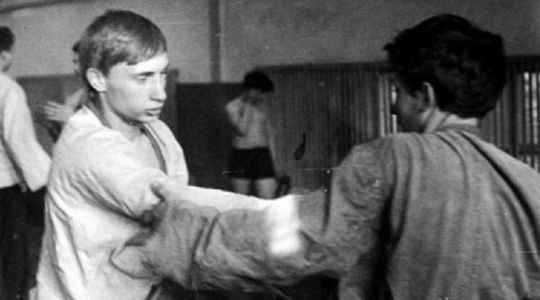Not all unhappy children end up as bloodthirsty dictators. But they all grew up in stressful environments. Hitler, Stalin and Saddam Hussein suffered the blows of violent fathers. What about Vladimir Putin, born in the USSR? The former KGB spy told his beginnings only once, in 2000, to three journalists (Vladimir Poutine ; first person, So Lonely). “He was going to be elected president, but the public did not know him, his advisers wanted to change that; he was frank and sincere as he will never be again after these interviews”, argues one of the co-authors, Natalia Guevorkian.
The master of the Kremlin reveals a difficult youth there. He grew up in a cold, spartan communal apartment in Leningrad – present-day Saint Petersburg. His working-class parents experienced the horrors of World War II. His mother suffered from starvation, to the point, once, of “losing consciousness” and being “taken for dead”. His father, “very authoritarian”, nearly got killed on several occasions during operations behind German lines. Before the “miraculous” arrival of little Vladimir in 1952 (his mother was then 41 years old), the Putins had lost two sons: one shortly after being born, the other in his second year of life, during the siege of Leningrad.
“It’s a sinister childhood, which we always find in the great ordinary criminals, like Michel Fourniret, or of the State, like Stalin or Milosevic, notes the psychiatrist Pierre Lassus, who wrote on these profiles (The Childhood of Crime, Francois Bourin). We also recognize in Putin behaviors that can be related to pathologies of the paranoid or megalomaniac type, which his childhood terrors may have nourished.
“You have to strike first”
His escape: the bad shots. “I was really a little scoundrel”, he says, confessing a “fighting character”. At “10-11 years old”, he joined a small martial arts room where he learned sambo (Russian wrestling), then judo. There is a trainer and mentor, Anatoli Rakhline, who “gets him off the street”. “If I hadn’t started playing sports, I don’t know how my life would have turned out,” he says.
Channeled, the little “Volodya”, nourished with spy literature, dreams of being an agent of the KGB, the Soviet political police. To the point of knocking on the door of the local management “to understand how to become a spy”, when he was in the ninth year of school (equivalent to the third). “A mind-blowing approach, which marks an early need for recognition and emotional compensation,” says Pierre Lassus.
Putin delivers another edifying anecdote in First person : his confrontation with a rat, which he hunted in his hall of building. “He turned around and jumped on me. It surprised me and I was very scared. The rat started chasing me. […] I was faster than him and I managed to slam the door in his face.” What lesson did he learn from this episode? Asked further about the Chechen conflict, he replies that “you have to knock the first and so strong that your opponent will not get up”. A sentence that resonates dramatically today.
